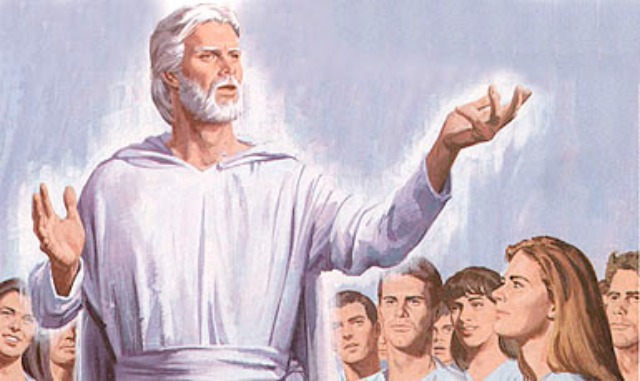Question
Hello Gramps,
I’ve recently had a friend, whom I usually consider quite knowledgable in church doctrine, insist that Heavenly Father was not only omnipotent, but also omnipresent. Obviously God is omnipotent, but I have always been under the impression that he was not omnipresent as he has a physical, resurrected body that could only be in one place at a time. Could you shed any light on this?
Shawn
Answer
Dear Shawn,
I think you’ll receive the greatest benefit by asking your friend what she means by omnipresent (there’s quite a few properties ascribed to it as I’ll detail below). I’ll address some of the principles the term encapsulates, but only your friend knows what she intends to convey when she uses it.
The tripartite omni‘s associated with God are omnipotent (all-powerful), omniscient (all-knowing), and omnipresent (ever present). Of these three, only omnipotent appears in the scriptures (see Revelation 19:6, Mosiah 3:5,17-21, and Mosiah 5:2,15). Even in the Vulgate (the Latin translation of the Bible – the likeliest place to find such fancy jargon), omnipotens shows up multiple times but not omnipraesens. Ascribing omnipresence to God is not overtly done by the scriptures but by theologians. In this, omnipresence is a practical extension of the omnipotence and omniscience of God.
God is omnipresent in the sense that all things are before Him, as an extension of His omniscience. “Can any hide himself in secret places that I shall not see him? saith the Lord.” (Jeremiah 23:24). God is also omnipresent in the sense that His power still reaches all of His creation, as an extension of His omnipotence. The Psalmist combines both of these thoughts well.
“Whither shall I go from thy spirit? or whither shall I flee from thy presence? If I ascend up into heaven, thou art there: if I make my bed in hell, behold, thou art there. If I take the wings of the morning, and dwell in the uttermost parts of the sea; Even there shall thy hand lead me, and thy right hand shall hold me. If I say, Surely the darkness shall cover me; even the night shall be light about me. Yea, the darkness hideth not from thee; but the night shineth as the day: the darkness and the light are both alike to thee.” (Psalms 139:7-12).
Mark it well! There is no secret place where God does not see you! You cannot escape His spirit. Not in heaven, nor hell. For Latter-day Saints, we recognize the Lord’s arm of mercy extended to His wayward children. Even where the Lord does not go in person (such as spirit prison), He organizes and authorizes so His power can reach out like divine tentacles. And even the willfully rebellious cannot escape His power, as divine judgments are poured out against them.
Finally, the third traditional sense in which God is omnipresent is a literal one. From the same verse in Jeremiah we read: “Do not I fill heaven and earth? saith the Lord.” This is more than the power of the Lord or His all-searching eye. As Thomas Aquinas summarizes: “Therefore, God is in all things by His power, inasmuch as all things are subject to His power; He is by His presence in all things, as all things are bare and open to His eyes; He is in all things by His essence, inasmuch as He is present to all as the cause of their being.” (Summa Theologica 1:8.3). Latter-day revelation has given us a variation on this conclusion. Rather than arguing over God’s essence and role as primal Mover, we instead have a revelation on the light of Christ which “proceedeth forth from the presence of God to fill the immensity of space—The light which is in all things, which giveth life to all things, which is the law by which all things are governed, even the power of God who sitteth upon his throne, who is in the bosom of eternity, who is in the midst of all things.” (D&C 88:12-13). It is through this light, which “fills the immensity of space” by which God “fills heaven and earth”.
Prophets and apostles in these last days use the three omni‘s when describing God. Even with omnipresence we enjoy a large overlap with traditional Christianity. Where we differ is often clarified, as in this description of God given by Elder Francis M. Gibbons.
“[Jesus], with the Father, … shares characteristics unknown to mortal men…. He knows all things and, therefore, he is omniscient; he has all power and, therefore, he is omnipotent; and through the Light of Christ, he is omnipresent.” (The Savior and Joseph Smith: Alike and Yet Unlike). And Elder McConkie likewise clarified (while mentioning God’s corporeal nature that you brought up): “This great God, the Lord Almighty, is a personage of tabernacle. He ‘has a body of flesh and bones as tangible as man’s’ (D&C 130:22). He is omnipotent, omniscient, and omnipresent. He has all power, knows all things, and, by the power of his Spirit, is in and through all things.” (The Lord God of the Restoration).
Gramps







